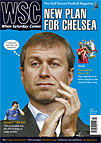 The press are having a field day as Chelsea and Manchester United head to Moscow for the Champions League final
The press are having a field day as Chelsea and Manchester United head to Moscow for the Champions League final
By the day of the Champions League final, recycling bins everywhere will have been full to the brim with pull-out previews, all the daily papers, broadsheets as well tabloids, having produced supplements of some sort. Meanwhile, anyone intent on reading the post-match analyses will use up all their waking hours until Christmas.
Before the game, the teams and tactics were analysed with grim efficiency; this was not a mere football match, but a momentous occasion, viewed by many as the biggest in English football history (or at least since 1966). Moscow, once imperilled by Hitler and Napoleon, was now facing an “English invasion”, albeit a reluctant one – the Russian capital was difficult to get to and hugely expensive to stay in, plus the grass pitch wasn’t even ready for the match.
The fact that this season marked the 50th anniversary of the Munich air disaster led some to think that a Man Utd victory was preordained, while a recent personal loss for Frank Lampard – which produced the most extensive coverage there has ever been on the funeral of a footballer’s parent – led to numerous headlines about an emotional family double following Uncle Harry Redknapp’s FA Cup win. This was a match, the Guardian concluded portentously, that would have “resonance for years to come”.
Self-congratulation was never far away. The Times’ Martin Samuel claimed England is in a league of its own, that the best international players will now always prefer to move to the Premier League rather than Italy or Spain. He was, of course, referring exclusively to the top four English clubs. Under the headline Resistance futile when Lenin gets overlooked Paul Hayward of the Daily Mail revelled in the “Everest moment of Premier League imperialism” and concluded that English football’s “old inferiority complex has been entombed this week close to Lenin”. Tactical previews were also full of extravagant flourishes, with the Daily Telegraph’s Henry Winter seeing Chelsea as a “broadsword” facing United’s “elegant rapier” and expecting a “stirring affair… Chelsea stir respect but Man Utd stir the soul”.
As the stage had been set so thoroughly, all that was left to do after the match was to pick up the threads and push certain characters forward, aided of course by an inexhaustible supply of Russian puns. Chelsea were Sickle as a parrot, whereas United were Red Tsars and the Sun rated managerial performances in the “Battle of the Premlin” as either “Crem de la Krem” (good) or “Gremlin” (bad). Individual sub-plots returned, as Oliver Holt of the Daily Mirror began a tribute to Ferguson’s managerial record with the lines: “Moscow’s got a new great dictator this morning. A new enlightened despot.” Character stereotypes were strengthened – John Terry was the Iron Man, “proof that boys do cry”, while the “footballing gods” were held in obeisance in several places. According to the Sun’s Steven Howard, the deities had indulgently smiled on Cristiano Ronaldo as they “drove a stake through John Terry’s heart. The one with Chelsea engraved on it.” Paul Hayward in the Daily Mail returned to his imperialist theme, advising: “When Americans or remote jungle tribes ask what’s so special about English club football, show them a tape of this astonishing match.”
Elsewhere in the same paper, however, there was a voice of dissent. Anyone accustomed to the Little Englander invective that is usually scattered through Jeff Powell’s columns will have been surprised to see him offer one of the most pertinent comments on the match. Powell reflected on the view expressed by many neutrals in the build-up to the match that it wasn’t so much a final as a fixture: “This was English football’s risible and rejected 39th game slipping thorough the back door to Russia.” Richard Williams in the Guardian also felt that he had been present at a parochial event – “only a Premier League game with extra time and trimmings” – but such a sense of perspective was rare among the supplements.
A special mention must go to the Times for the sheer scale and overblown nature of their reaction. Scores of pages were devoted to the final, both within the paper and in two 16-page special supplements. Benedict Nightingale, the paper’s theatre critic, was dispatched to review the “first night” in dramatic style, whereas Tony Cascarino addressed the same theme as Jeff Powell but from the opposite perspective: “Maybe there is something in the idea of the ‘39th game’ after all.” However, no one should be surprised to see the Times lead the way in hyping a match that served as a global advertisement for the Premier League. The former “newspaper of record” is, after all, a wholly owned subsidiary of English football’s paymasters, News Corporation. Ed Upright
From WSC 257 July 2008